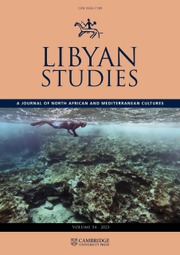Article contents
Libyan Valleys Survey
Published online by Cambridge University Press: 03 March 2015
Extract
This project began in 1979. Its objectives are to locate, survey and analyse the extensive remains of ancient agricultural settlement that can be found in the wadis of the hinterlands of Tripolitania, Sirtica and Cyrenaica. Within this framework, established by the Department of Antiquities of the Libyan Arab Republic and UNESCO, is the archaeological aim of recording the evidence for periods when extensive areas of the pre-desert were, for whatever reason, cultivated in ways that are not immediately possible today, and in the longer term of assessing those areas where modern farming might be re-established. Archaeology is thus brought into direct line with the aims of the modern world. This paper presents some preliminary comments on the findings of the 1979 survey, which (as we conclude) have raised questions about ancient settlement and land use rather than provided answers; we hope that our full report on the project in Libya Antiqua will be able to offer a reasoned assessment of these issues, understanding which is surely critical for modern agricultural planning.
The first season of fieldwork by the UNESCO-sponsored Anglo-Libyan team under the auspices of the Department of Antiquities, Tripoli, occupied the period from late August to early October. The succeeding months have been taken up with the assimilation, processing and plotting of the initial results. The group was led on the British side by Dr Graeme Barker, of the University of Sheffield, and Professor G. D. B. Jones, of the University of Manchester. Their grateful thanks are due to Dr Salaheddin, at the time President of the Department of Antiquities, and his successor Dr Abdullah Shaiboub, who was at the time in Britain and took an active part in the preparations for the 1979 programme. Mr Abdul Wahab, Controller of Antiquities for Tripolitania took part in the original preliminary survey conducted by Mr Charles Daniels, Chairman of the Society for Libyan Studies, and Professor Jones late in May 1979. Mr Omar Marjub, Controller of Antiquities for Leptis Magna, kindly provided the base for the team at Homs and helped in a variety of ways, both at Leptis and during his visit with Dr Salaheddin in the field. The day-to-day work in the field was organised by Mr Abdullah Ahmed and Mr Muhammed Shitewi, Assistant Controller of Leptis Magna, to whom the Directors are deeply grateful. In Tripoli, the British Ambassador and his wife, Mr and Mrs A. Williams actively fostered the work on the project, not least through their hospitality to members of the team. A particular debt of thanks is due to Olwen Brogan for her constant advice, encouragement and active presence in the field, as well as to Miss Tina Watson.
Information
- Type
- Research Article
- Information
- Copyright
- Copyright © Society for Libyan Studies 1980
References
- 21
- Cited by

